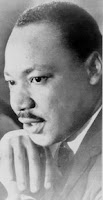AFRICAN-AMERICANS
AND THE AMERICAN REVOLUTION
 |
| Dr. Martin Luther King, Jr. |
Today
we remember Dr. Martin Luther King, Jr. and the work he did to promote equal treatment
and opportunity for all. This champion of the African-American civil rights
movement, and Baptist preacher, pursued his goal by way of non-violent civil
disobedience. In his 1963 Washington D.C.
"I have a dream that one day this nation will rise up and
live out the true meaning of its creed: 'We hold these truths to be
self-evident: that all men are created equal.' . . .
I have a dream that my four little
children will one day live in a nation where they will not be judged by the
color of their skin but by the content of their character."
 |
| Crispus Attucks |
The story of
African-American patriots goes back to the very beginning of our nation – those
who served in the American Revolution. As
early as 1770, black Americans were supporting the Patriot cause. One of the
first battles was the March 5, 1770 Boston Massacre which
aimed to remove British troops from Boston
 |
| 1975 Postage Stamp honoring Salem Poor |
Salem
Poor, a freed black slave, was one of the Minutemen who fought at Concord , Massachusetts Bunker Hill , Saratoga Stony Point .
In November of 1775, the English royal governor
of Virginia, Lord Dunmore, issued a proclamation declaring martial law, that
all Patriots were traitors, and promising freedom for any slaves who would join
the Loyalist cause. He thought a slave uprising would create a fear among the
Patriots, cause mistrust between master and slave, and make the Patriots back
down from seeking independence. It’s estimated that somewhere between 800 and
2,000 slaves from both Loyalist and Patriot owners enlisted with Dunmore ; however it was short
lived as Dunmore fled the colony in 1776,
taking only 300 former slaves with him.
Those slaves who joined the Loyalist or Patriot
cause were not motivated by revenge against their masters but for the
opportunity to secure their freedom. The decision to support one cause or the
other was as divided in black families as it was in white ones. This was
perhaps our first civil war, separating families and friends.
The
contradiction of white Patriots desiring independence from Britain

Great post. Gave me goosebumps. Of course, I already knew about MLK Jr., but not the other men. Thanks for sharing and broadening my education of African-Americans during the American Revolution. God bless.
ReplyDeleteThank you, Debbie. I thought their motivation for fighting was interesting.
ReplyDeletePrinciples or pragmatism... I wonder which is the stronger motivator for revolution. It's part of the crux of the matter with my WIP Andrew's Forge.
ReplyDeleteI can't help thinking that it was a sad, sad situation for those who backed the patriots, since England granted slaves their freedom long before America. Bitter-sweet victory.
ReplyDeleteThanks for stopping by Judith and Dina. I've no doubt they were torn, and like the colonists, it divided families and friendships.
ReplyDelete